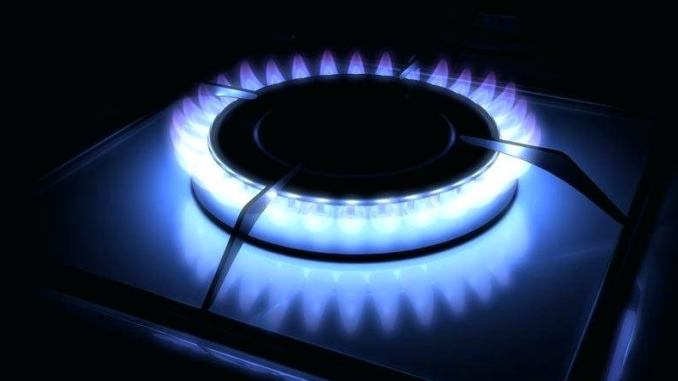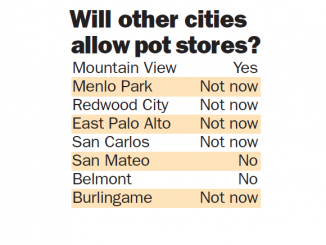
BY ELAINE GOODMAN
Daily Post Correspondent
The city of Palo Alto is eyeing a ban on natural gas in new buildings starting in 2022.
But in an intermediate step that the City Council will discuss tonight (Nov. 4), the city would offer two choices for new buildings. One option would be to go all-electric without any gas utility hookups.
Alternatively, the new building could be designed to use natural gas and electric energy, but in a way that makes it easy to switch to all electric in the future. The so-called mixed-fuel building that uses gas and electricity would also have to be more energy efficient than what’s required by a state standard.
If the council approves the plan, the natural-gas restrictions would apply to new homes, multi-family buildings of three stories or less, new office and retail buildings, and hotels, motels, and four-story multi-family buildings. The energy-efficiency requirements for new structures using both natural gas and electricity would vary depending on the type of building.
The council will also be asked to vote on a resolution that would set a goal of requiring new buildings to be all-electric by January 2022.
City officials see a ban on natural gas in new construction as a way to help achieve its goals for reducing greenhouse gas emissions. The city of Palo Alto Utilities Department says that its electricity comes from renewable and hydroelectric sources, but “natural gas is a fossil fuel that will always produce greenhouse gas emissions.”
The city projects that switching from natural gas to electricity in new and existing buildings would bring it 43% of the way toward its greenhouse gas reduction goal.
Five percent of that would come from making new buildings all electric, with the remainder coming from electrification of existing buildings.
Keeping up with other cities
If the council approves the natural gas restrictions, Palo Alto would join Berkeley and Menlo Park as cities that have taken aim at natural gas use in new construction.
In July, Berkeley became the first city in the U.S. to ban natural gas lines in new low-rise residential buildings, effective Jan. 1.
Menlo Park City Council in September approved a requirement for new single family homes and apartments that are three stories or less to have electric clothes dryers, pools, space heaters and water heaters. Stoves and fireplaces can still be natural gas, but electric hook-ups must be provided.
In addition, new office, retail and apartment buildings over three stories must have all-electric appliances and install solar panels based on the square footage of the building.
Some Menlo Park residents argued that natural gas appliances allow residents to cook, have hot water and heat their homes during electric power outages. That may be even more of a concern in some areas following PG&E’s recent power shut-offs aimed at preventing wildfires when fire danger is high.
A ‘passion’ for gas
And some home cooks, as well as professional chefs, prefer to cook with the open flames that natural gas provides. A report to the Palo Alto City Council for tonight’s meeting acknowledges that many residents have a “passion” for gas cooktops and gas fireplaces.
The city of Berkeley addressed many of the concerns about banning natural gas in a report to its City Council in July.
Many newer natural gas appliances need electricity to start, and so they’re not useful during electricity outages, the report said.
“Thus, having more gas infrastructure as a backup will become increasingly less useful,” the report said.
In contrast, the report said, electric heat-pump water heaters contain a substantial amount of hot water that would be available during an outage.
And electric induction cooktops have improved enough that even some famous chefs are now using them, the city said.
“Improvements in electric induction cooktop technology suggest that the city of Berkeley can simultaneously maintain its rich culinary culture while taking action to reduce fossil fuel emissions in new buildings,” the report said.
Cost
The Berkeley report says that according to “conventional wisdom,” natural gas is cheaper than electricity because the cost is lower per unit of energy. But electric appliances are more efficient and reduce costs by using fewer energy units.
In addition, as natural gas is used less, the costs to use it will be spread among fewer customers, potentially raising costs, the report said.
Because Palo Alto is built-out, relatively few new buildings are constructed each year. To address electrification of existing buildings, Palo Alto Utilities is planning to expand its incentives for electrification over the next year.
The department plans to offer incentives for heat pumps, induction cooking and high-efficiency electric clothes dryers.
A rebate is also planned for homeowners who install an electric vehicle charger and upgrade their master electric panel at the same time.




Everyone is freaking out about homelessness and affordability and yet the cities are passing laws like this that just increase the cost to build and run homes – making affordability even worse. We are decades away from fully renewable electricity, so this just change means burn more natural gas at the power plant to send more electricity across the grid to power electrical appliances in the home. So it costs more and it’s less efficient than burning gas at home. Heat pumps do have promise for water heating but they never pay back at current prices – they cost $1,500 more to purchase, and save about $100 per year vs a traditional gas water heater, but only last 10 years…
Why on Earth would PA institute a natural gas ban and prefer ‘All Electric” power??? PG&E HAS PROVEN TO BE COMPLETELY IRRESPONSIBLE WITH THEIR TRANSMISSION AND FEEDER LINES CAUSING THE DESTRUCTION OF ENTIRE TOWNS AND COMMUNITIES BY FIRE INITIATED BY THEIR EQUIPMENT.
1. Natural gas is cheaper than electricity
2. While natural gas production does release greenhouse gas emissions, it burns much cleaner than coal and poses much less damage to the environment
https://homeguides.sfgate.com/comparing-cost-gas-furnace-vs-electric-heater-61395.html
So why would a city council eliminate natural gas?
Socialists are pushing the Green New Deal, which calls for outlandish things like ending air travel, building high-speed rail (that’s worked great here in California), tearing down all buildings and replacing them with energy efficient buildings, guaranteeing a job and paycheck to everyone, etc. This is the platform of Alexandria Ocasio-Cortez, age 29, who says the world is going to end in 12 years if the Green New Deal isn’t passed into law.
The AOC activists are pushing cities all across the country to pass Reach codes, which are the rallying cry of extreme environmentalists who are bent on destroying capitalism.
The city council doesn’t want to look like anti-capitalists to normal everyday voters. But they want to appease these radicals. So council will adopt the natural gas bans with a wink to the AOC followers.
Yes, banning natural gas will make heating for residents more expensive. But city council has no problem kicking around the low- and middle-income residents. They favor every regressive tax that is proposed, and this is no different. They secretly support making income inequality worse, and Reach codes help them do it.
How much will this reduce the temperature?
Bertha, Erica, and Dan: All good points! This is just another in a long line of inane “do-gooder” legislation that adds restrictions (and costs) to our lives in order to “send a message”, but without any real benefit. Like bans on plastic straws (ooh, THAT’LL make a big difference!) and bans on plastic shopping bags (so now I have to buy plastic trashcan and wastebasket liners instead of repurposing the free bags I used to get from the grocery store — so the only result is that I have to pay more, but the same amount of plastic bags are still used).
And as Dan pointed out, most of our electricity comes from natural gas anyway, so this new ordinance won’t reduce greenhouse gas emissions one iota. It may even INCREASE them!
I am all for 100% electric. We must take action now before it gets to late to combat climate change. Look at what us happening with PG&E. We want to have public utility with no gas. Thanks
Don’t pass laws that raise the cost of construction or home heating! People are having trouble affording housing now. We don’t need the city making things more expensive!!!
I’m for all electric too! When the people who decide to shut off electricity for whatever reason, I don’t want a backup to run my stove, heater or water heater. I want PG&E and the City to have complete control over my life. Why would I want an alternative energy source? I want to be at the mercy of the geniuses who turned off the power several times in the past few months.
I always wonder how much stupidity Bay Area residents can put up with before they vote these stupid democrats out.
Leaving aside the questionable value and serious consequences of banning gas in newly constructed buildings I would like to focus on the credentials of Palo Alto City council.
If they are so committed to “no gas” as a way to reduce carbon footprint they should disclose what they use in their homes and in any other real estate they own, and what kind of cars they drive.
Look forward to their disclosure.
Palo Alto Utilities already funnels an EXTRA $20,000,000 to the General Fund by over-charging its customers. This is just another money grab. Shame on them. Shame on us for falling for their nonsense. They tell us to conserve energy and then charge us MORE for not using enough. Ridiculous racket.
Yaaaa… as PG&E is turning off peoples electricity for a few weeks at a time. Even when the power dies I still have hot water, heat and a stove…
They are so smart or really don’t give a hoot, wanting to change the building code when we are in the middle of electricity shut offs for years to come?
Who elected those clowns ?
Well…you can add this to the list of reasons I won’t move to California. Cooking with electricity will be a non-starter for me until electric ranges are as responsive and offer the kind of heat needed for roasting peppers on a flame. Oh wait electricity doesn’t provide flames. Also, you can light a gas appliance manually if the electricity is out and the starter doesn’t work, so the argument that it isn’t a viable back up to electricity isn’t entirely accurate. Additionally, I suspect folks will convert back to wood burning fireplaces and outdoor pits when gas is no longer an option. I’m an environmentalist that likes my trees. On the upside, maybe enough people will love upset enough that they’ll leave California. That could bring housing prices to a reasonable and help restore the Colorado River. Let’s fix the leakages and problems with gas that lead to emissions and focus on the 66% of other emissions, helping our global neighbors who are still reliant on wood would go a long way as well.